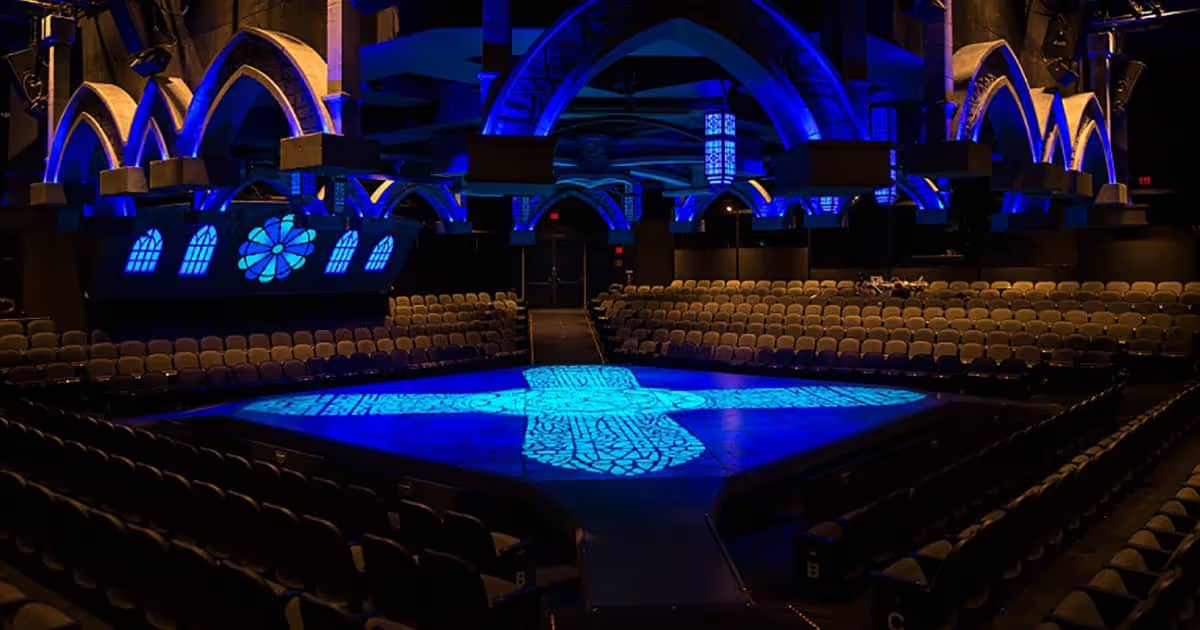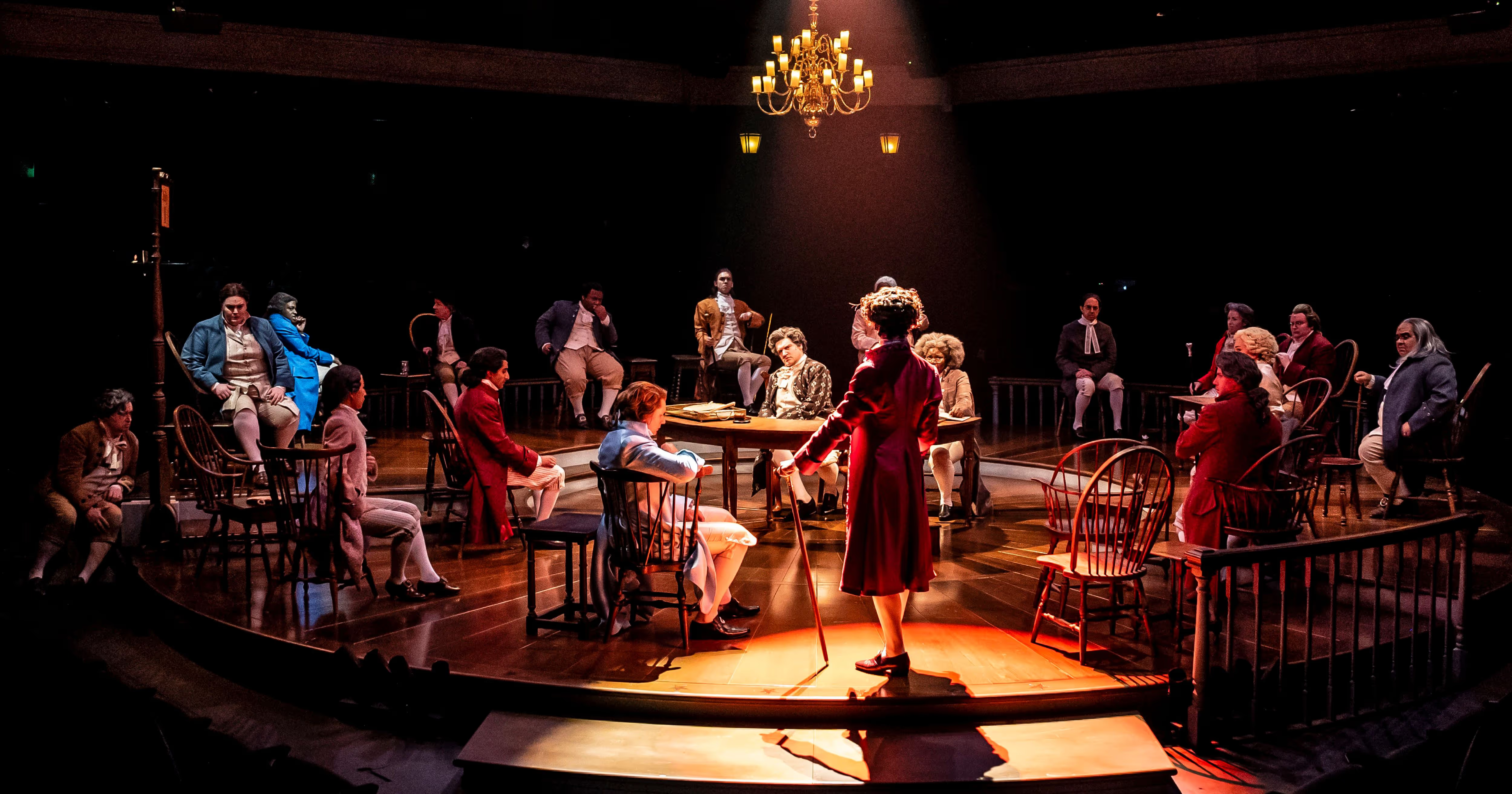Let’s Look at Democracy, Again: A Review of “1776” at the Marriott Theatre
RECOMMENDED
A deadlocked Congress quibbles over minutia, periodically interrupted by signs of impending disaster. Egos clash, insults hurled. Then, at a critical moment of heated debate, someone bursts into song.
Sound familiar (until that last bit)? The scene isn’t present-day D.C. but Philadelphia at the dawn of the American Revolution. The play: Sherman Edwards and Peter Stone’s Tony-winning musical “1776,” which dramatizes the weeks leading up to the signing of the Declaration of Independence. The show is running at the Marriott Theatre in Lincolnshire through October 13.
I should say something up front: I love “1776.” I was obsessed with this play as a kid. I wore out a VHS of the 1972 film adaptation. My family watched it every Fourth of July the way many families watch “It’s a Wonderful Life” at Christmas. I found a copy of the script and read aloud with my equally nerdy friend, arguing over who would get the choice roles of John Adams or Benjamin Franklin. This makes me the kind of annoying, every-word-memorized fangirl whose standards for a revival are high, some might say unreasonably so. So you can take my word that, from the first roll of a snare drum to the Liberty Bell sounding the final signature on the Declaration, the Marriott Theatre absolutely nails it.
As a teenager I longed for a part in “1776”—in Congress, not one of the wives. If only high-school theater departments had been as forward-thinking as director Nick Bowling (and the 2022 Broadway revival) whose casting tosses out barriers of gender and race. The result is, as Bowling states in the program notes, a Congress that more closely resembles our own. And I found the ideals of independence, inter-dependence and democracy, so eloquently and entertainingly expounded on in Stone’s script, land on the ear with new resonance and complexity uttered from the lips of a diverse cast.
The Marriott Theatre is in the round, which turns out to be an excellent setting for a play where plot is driven by a big group of people in one room arguing with one another. There’s a feeling that the entire theater is Independence Hall and you’re—to borrow a phrase from another Revolutionary-era musical—in the room where it happened. The absence of wings or backstage also heightens the urgency of the dialogue—highly effective in a verbose show that could (I’m told) run the risk of being a bit talky.
But the momentum is high throughout the two hours and forty minutes of Marriott’s “1776,” which remains faithful to the original script. Outstanding choreography by Tanji Harper takes full advantage of the 360-degree stage, sweeping to live accompaniment by the fantastic Marriott orchestra, conducted by Brad Haak with orchestrations by Ryan T. Nelson. Chins tilt skyward and tailcoats fly to a tenor and baritone chorus pleading the future second president of the future United States to kindly sit down and shut up.
“1776” places considerable demands on the lead roles. Many songs require real vocal chops but are spaced out by lengthy scenes of fast-paced banter shot through with Enlightenment-era wit. It’s a play of both words and splashy musical numbers.
The Marriott cast is strong and in good voice all around. Adams appears in most scenes and Tyrick Wiltez Jones brings the requisite vigor and passion to the role, if playing it a bit broadly. Standouts include Richard R. Henry as Franklin, dropping aphorisms with convincing relish; Lucy Godinez as Richard Henry Lee, goofily punning off the character’s last name while belting out pride in their home state of Virginia; and Katherine Alexis Thomas as Abigail Adams, whose mountain-stream-clear voice and radiant stage presence makes you wish for another reprise of the epistolic “Till Then”—not my usual response to the song.
Heidi Kettenring also admirably does John Dickinson, Pennsylvania landowner and Adams’ main antagonist. Kettenring delivers Dickinson’s cutting rebuttals with precision, leading the conservative side chorus in “Cool, Cool, Considerate Men,” and stating a convincing argument for why self-interested, wealthy people are continually elected to high office: “Most men would rather protect the possibility of becoming rich than face the reality of being poor. That is why they will follow us.”
And let’s not forget Jay Westbrook’s nameless courier delivering a haunting dirge to fallen young soldiers; Mary Robin Roth’s rum-soaked, pitch-perfect Stephen Hopkins; or Gabrielle Lott-Rogers’ portrayal of congressional secretary Charles Thomson, in an interpretation that affords the character a dignity missing from the original casting.
The charm of this play, what thrilled me when I was young and what continues to delight me decades later, is not just the history lesson packaged with sprightly songs… though that is, make no mistake, an effective medium. I’m sure I learned about triangle trade in a history book at some point, but nothing drives home New England’s complicity in the atrocity of American chattel slavery like baritone Edward Rutledge of South Carolina, shaking the rafters with the scathing “Molasses To Rum”—in this case Matthew Hommel, delivering a breath-suspending performance.
But the real timelessness of “1776” is its insights into human nature and just how hard it is—and how necessary—for a group of people to work together to a common purpose. Questions about the will of constituents versus those elected to represent them, the troublesome conflation of a person and the cause they tout, infighting amongst progressives about incremental progress versus unthinkable compromise, it’s all in there. The line that got the biggest laugh opening night: Adams shaking his head to Franklin as they enter a sloven and disorderly Congress, “Look at it, Doctor: Democracy.”
Yes, let’s look at it. And laugh when we can. And sing occasionally. And keep going.











